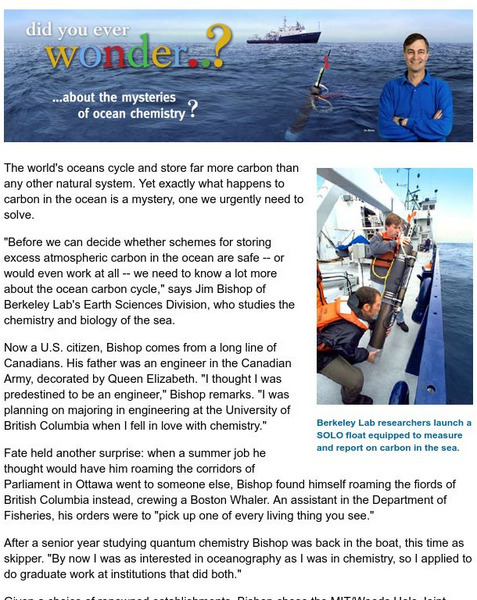Curated OER
Changing Planet: Fading Corals
Show the six-minute video, "Changing Planet: Fading Corals," and then demonstrate how calcium carbonate forms a precipitate in the presence of carbon dioxide. Separate your scientists into small groups to gather information about coral...
Columbus City Schools
Photosynthesis and Respiration
Thirty percent of the world's oxygen is produced by rainforests found throughout the world. Seventh grade learners explore the processes of photosynthesis and respiration through 10 days of labs, manipulatives, and discussions. They...
Curated OER
Losing An Island
Students examine carbon dioxide and determine the impact of greenhouse gases on the earths spheres. In this pollution lesson students complete a lab activity to see the impact of gases on the environment,
Curated OER
Oxygen Factory
Fourth graders examine the interdependence of the oxygen and carbon dioxide cycle in an ecosystem through a laboratory investigation. After a lecture/demo, 4th graders complete the lab in groups.
Curated OER
Composting
Using 2-liter bottles, junior ecologists create composting tubes in which they place nitrogen-rich and carbon-rich materials. They observe what changes occur over two weeks' time. Provide more specific direction to your class as to what...
Curated OER
WorldWatcher Project: Global Warming Project
Young scholars conduct lab activities, computer visualizations, and other various forms of research in preparation for a role-play activity in which they assume the identities of advisors to various heads of state on the subject of...
Curated OER
Terrestrial Sequestration - Photosynthesis and Cellular Respiration
Students investigate how plants absorb carbon dioxide during photosynthesis. In this biology lesson, students differentiate photosynthesis and cellular respiration. They discuss the important role of plants in the environment.
Curated OER
Terrestrial Sequestration- Photosynthesis and Cellular Respiration
Students examine the differences between cellular respiration and photosynthesis. For this cellular processes lesson students complete a group lab activity to see how climate change affects their lives.
Curated OER
Dust in the Wind; Chemicals in the Water
Students explore mechanical and chemical weathering at stations. They articulate some mechanisms of chemical and mechanical weathering through exploration in a lab. Students stations describe how chemical weathering differs from...
Curated OER
Stomata: Microscopic Openings that Let Plants Breathe
Students participate in a lab experiment to observe and measure the opening and closing of stomata. They focus on photoperiod, locate and identify stomata on a leaf and explain the role of stomata in the daily functioning of a plant.
National Renewable Energy Laboratory
Biomass: Biogas Generator
It's a gas. Middle schoolers build a biogas generator following the directions in this resource. After a few days of observation, they demonstrate that the gas given off by the decomposing manure is flammable. The activity concludes as...
Curated OER
Introduction to Dissolved Oxygen and Demonstration of a Simple Test Procedure
Young scholars explain the importance of dissolved oxygen in water ecosystems. They describe the aquatic oxygen cycle and the effect of water pollution on oxygen. They make observations, collect data and draw a conclusion.
Curated OER
Teaching about the Effect of Photosynthesis and
Students demonstrate the effects of photosynthesis and respiration. They decide which variables to analyze in a microcosm study. They produce a written paper, oral presentation, poster, or multi-media presentation
Curated OER
Hazards: Third Grade Lesson Plans and Activities
Learners discover hazards related to volcanoes and predict the effects these hazards have on people and land. As blossoming geologists explore various volcanic eruptions, including the hazards associated with them, they create their own...
Annenberg Foundation
Geometry 3D Shapes: Euler's Theorem
How do you get a theorem named after you? Euler knows what it takes! The third lesson of five asks pupils to use an interactive activity to compare the faces, vertices, and edges of seven different three-dimensional solids. They use...
Curated OER
It's Okay to Exhale: Photosynthesis and Cellular Respiration
Students will observe the differences between photosynthesis and cellular respiration. Then they observe the links due to climate changes and relate how climate change affects their lives.
Curated OER
Consider the Issues
Students develop and express opinions on personal and societal issues in biology through journal entries (written and other forms), oral position statements and group discussions.
Annenberg Foundation
Annenberg Learner: The Carbon Cycle
This lab uses a robust model of the carbon cycle to give students an intuitive sense for how carbon circulates through the atmosphere, biosphere, oceans, and crust. It allows them to experiment with how human input to the cycle might...
Annenberg Foundation
Annenberg Learner: Carbon Lab
This lab uses a robust model of the carbon cycle to give an intuitive sense for how carbon circulates through the atmosphere, biosphere, oceans, and crust.
Center for Innovation in Engineering and Science Education, Stevens Institute of Technology
Ciese: Carbon Imbalance: Algae to the Rescue? [Pdf]
A 95-page learning module that integrates biology, chemistry, and engineering. It includes in-class labs, virtual labs, and engineering design activities. Working with algae, students learn about and investigate how photosynthesis,...
Annenberg Foundation
Annenberg Learner: The Habitable Planet: Carbon Lab
An interactive lab simulation demonstrates the effects of increased carbon in the atmosphere and how that increase contributes to climate change. A data table for student records is available for download.
Climate Literacy
Clean: Carbon Dioxide Sources and Sinks
In this lab activity, students use a chemical indicator (bromothymol blue) to detect the presence of carbon dioxide in animal and plant respiration and in the burning of fossil fuels and its absence in the products of plant...
Other
Koshland Science Museum: Earth Lab: Degrees of Change
This resource provides information on all of the aspects of global warming, climate change, and the future of the earth.
Lawrence Berkeley National Laboratory
Berkeley Lab: Did You Ever Wonder? About the Mysteries of Ocean Chemistry?
Students investigate ocean chemistry. The article discusses Jim Bishop, ocean cycle, the biology of the sea, and carbon in the sea. The resource consists of pictures, quotes, and links to additional resources.





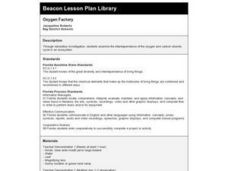

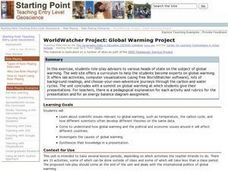

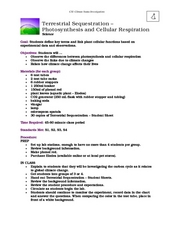
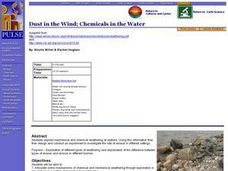








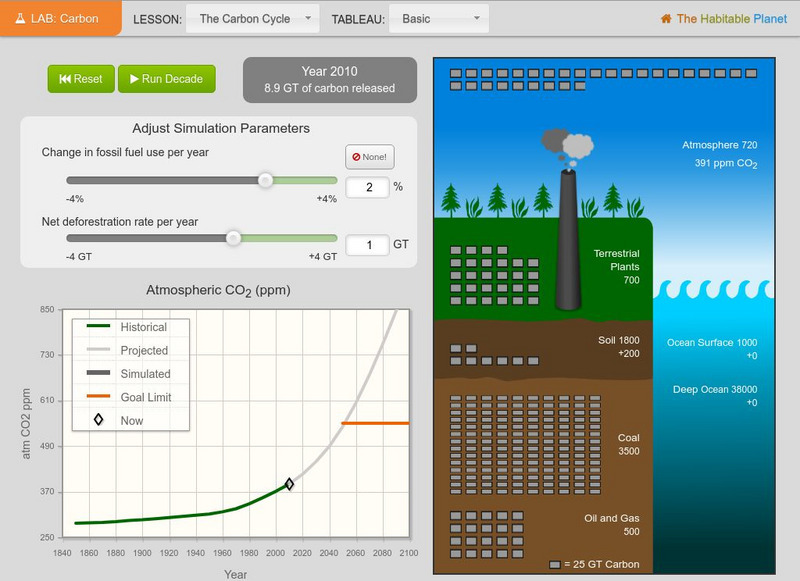
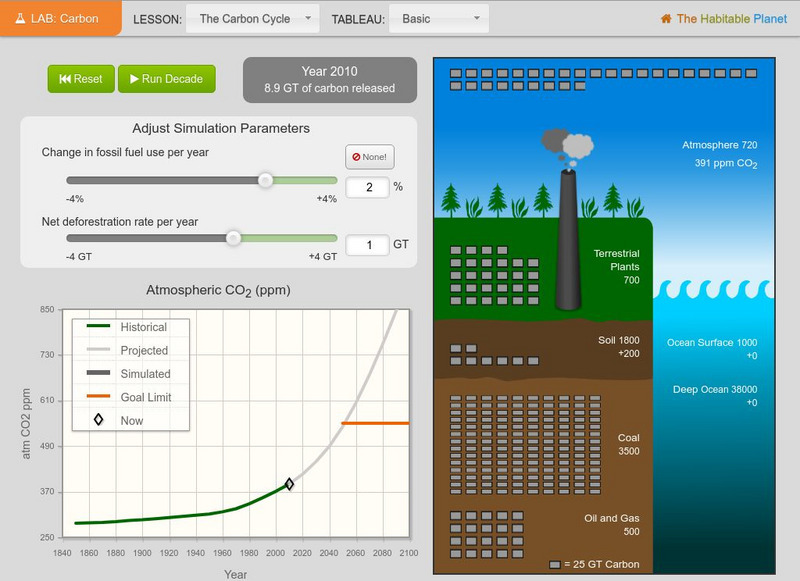
![Ciese: Carbon Imbalance: Algae to the Rescue? [Pdf] Unit Plan Ciese: Carbon Imbalance: Algae to the Rescue? [Pdf] Unit Plan](http://content.lessonplanet.com/resources/thumbnails/455842/large/bwluav9tywdpy2symdizmdeyny0xmdcynjyylwcwy3uxni5qcgc.jpg?1674855345)



